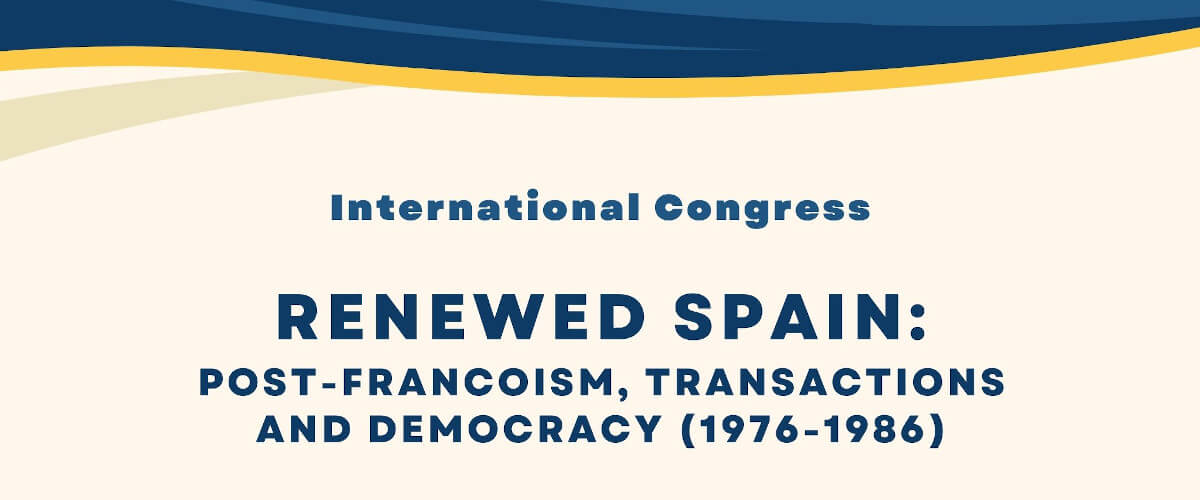julho, 2024

Detalhes do Evento
International congress that aims to analyse the history of Spain between 1976 and 1986 from a multidisciplinary, transnational and comparative perspective. Renewed Spain: Post-Francoism, Transactions and Democracy (1976-1986)
Ver mais
Detalhes do Evento
International congress that aims to analyse the history of Spain between 1976 and 1986 from a multidisciplinary, transnational and comparative perspective.
Renewed Spain:
Post-Francoism, Transactions and Democracy (1976-1986)
In a context of speedy social change that took place in Spain in the 1960s and 70s, marked by the most intense cycle of political conflict that the country experienced since the establishment of the dictatorship, Franco’s death put the regime under pressure. The subsequent process of political, but also social, economic and cultural transformation, the so-called transition, ended up being configured as an ideal model of transition from dictatorship to a democratic situation. In recent years, historians and social scientists have revisited the process, reconsidering elements such as its chronology or the actors involved, problematizing its formative character in relation to public history and memory. In fact, it is difficult to set a precise date for the beginning and the end of the transition, as it was a process that was arguably kickstarted year after the death of the dictator and which continued until after the failed coup of 1981, lasting, in the opinion of some, until the phase of political stabilization associated with the post-1982 socialist electoral victories, Spain’s accession to the European Community (1986) and the inception of the regional autonomy system (1979-83). Other important measures, such as divorce, were only implemented in the course of that decade. It is clear that the consolidation of democratic institutions and values and respect for international legal standards were slow to arrive. For this reason, our chosen timespan covers the years 1976-1986.
The congress Renewed Spain: Post-Francoism, Transactions and Democracy (1976-1986) will take place at the Institute of Contemporary History (IHC), in Lisbon, on 5-6 July 2024. Pamela Radcliff will deliver a keynote speech.
>> 📎 Full updated programme (PDF, Portuguese) <<
Call for papers
The congress will include a number of panels covering different disciplinary approaches. These papers will have a maximum duration of 25 minutes and may be presented in Portuguese, English or Spanish. Interdisciplinary, comparative and transnational perspectives are welcome, for example, comparative analyses of transitions and revolutions in southern Europe and Latin America.
Proposals must be sent before 31 March 2024 to the email address congressoespanhalisboa@gmail.com.
They will be sent in a single MS Word file, including the following information: authorship, institutional affiliation, title of the proposal, summary (maximum 250 words), 3-5 keywords, a brief bio (maximum 200 words), and contact information (email address and telephone number). The selection of proposals will prioritize the maximum level of quality, originality and diversity of contributions.
>> 📎 Download the call for papers (PDF) <<
Organising Committee:
João Miguel Almeida (IHC — NOVA FCSH / IN2PAST / Universidade Aberta)
Manuel Loff (IHC — NOVA FCSH / IN2PAST / University of Porto)
Rita Luís (IHC — NOVA FCSH / IN2PAST)
Rubén Pérez Trujillano (University of Granada)
Carlos Píriz (University of Cádiz)
César Rina (UNED)
Pablo Sánchez León (CHAM — NOVA FCSH)
Arturo Zoffmann Rodríguez (IHC — NOVA FCSH / IN2PAST)
Tempo
(Sábado) 9:30 am - 6:00 pm
Organizador
Institute of Contemporary History - NOVA FCSH and University of Évora
